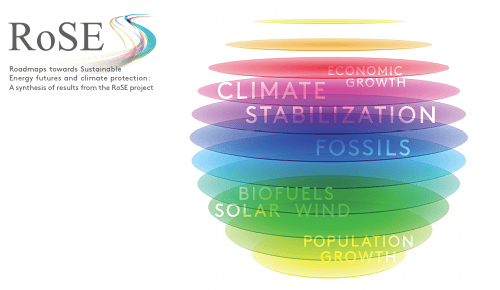The RoSE Policy Brief was published in June, providing a synthesis of results from the project.
The RoSE study is the first of its kind to systematically explore the impact of economic growth, population and fossil fuel scarcity, in scenarios with and without climate policy, using a model ensemble. Five established integrated assessment modelling teams from three important regions in international climate policy negotiations (EU, USA, China) participated in this project.
To sum up, the RoSE project highlighted economic growth and fossil fuel availability as drivers of CO2 emissions while indicating the major requirements of climate stabilization and providing some regional and sectorial perspectives.
More in detail, the major results each and every point from the executive summary:
- Economic growth: Neither slow nor rapid economic growth solves the climate problem by itself.
In the absence of climate policy and if energy intensity improvements continue along historical trends, higher economic activity implies higher energy demand and greenhouse gas emissions. The increase in energy and carbon intensity improvements with higher economic growth is overcompensated by the larger growth in per capita income. Even under slow economic growth assumptions, GDP will rise significantly above today’s level, leading to an increase in greenhouse gas emissions. - Fossil fuel availability: fossil fuel scarcity is insufficient to slow global warming significantly.
Low fossil fuel availability leads to levels of greenhouse gas emissions that are higher than those under climate change stabilization. Nevertheless, fossil fuel availability significantly influences the energy mix and the CO2 emissions in scenarios without climate policy. - Energy use: there are robust patterns in projections of energy use in the absence of climate policy.
Higher economic growth increases the scale of the energy system, which continues to be mostly supplied by fossil fuels. Structural differences in the energy supply mix occur for variations in fossil resource availability, particularly coal and oil supply.
The report highlighted also how climate policies are still globally fragmented and weak, absolutely insufficient for 2°C stabilization. Delaying action greatly increases the challenge of keeping warming below 2°C.
Climate policies are also important for the energy sector, having a strong impact on energy resource markets, resource rents and energy security.
Moreover, the project also investigated how reductions in forest cover and increases in land-use change CO2 emissions, and crucial role of investments and innovation. In particular, economic growth and fossil fuel scarcity can both stimulate clean energy innovation and non-fossil-fuel investments.
Read all the outcomes of the RoSE project:
RoSE Policy Brief (1st edition)
Kriegler, E., Mouratiadou, I., Luderer, G., Bauer, N., Calvin, K., DeCian, E., Brecha, R., Chen, W., Cherp, A., Edmonds, J., Jiang, K., Pachauri, S., Sferra, F., Tavoni, M., Edenhofer, O. (2013). Roadmaps towards Sustainable Energy futures and climate protection: A synthesis of results from the RoSE project (1st edition). Potsdam Institute for Climate Impact Research, Potsdam. Available here.
Researchers of the RoSE project participated in the Bonn United Nations Climate Change Conference – June 2013 (UNFCCC SB38) with the side event Leaving the Carbon in the Ground: The Role of GDP Growth and Fossil Resources for Climate Protection. The side event presentations are made available here.




